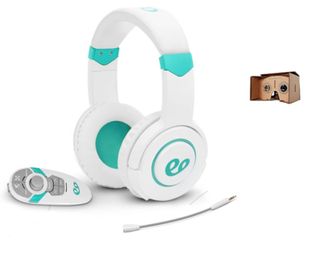VR Gets Audible: Next Galaxy's CEEKARS 4D Headphones Arrive

Virtual reality has experienced a surge in momentum in recent months, including increased availability and selection of display technology, graphics hardware, and software support, making the imminent leap to mainstream retail seem closer than ever before.
Brands such as Sony, HTC, Microsoft, Samsung, Oculus VR, Google, and a slew of others have announced or released a VR display device, while Nvidia and AMD will fight for supremacy to drive the best framerates and details for enthusiasts with the recently released TITAN X and an unannounced Radeon R9 flagship graphics card.
With display technology and graphics horsepower driving the fledgling VR market, Next Galaxy humbly seeks to truly crack the mainstream barrier and add a fourth dimension to the VR experience by introducing the CEEKARS 4D Headphones, finally filling an audiovisual gap in immersion technology.
Unlike traditional headphones that are designed for predefined scenarios using 2D perspective or fixed directional transfer of sound, CEEKARS uses physics-based audio rendering that assesses the physical attributes of the VR environment and overlays appropriate geometric data and haptic feedback to create a fully immersive and dynamic soundscape in real time, allowing you to experience media in a completely new way.
Next Galaxy said that you can actually feel the rumble of a passing train and hear the exact origination of a sound while moving around in a virtual world, watching your favorite movie, or listening to a live concert. CEEKARS 4D Headphones do not require special developer support, relieving content creators of having to resort to new techniques or sound manipulation to take advantage of the patented technology.

CEEKARS 4D Headphones are poised to please enthusiasts and average users alike by offering two models -- the Pioneer (for PCs) and the Innovator (for Bluetooth-enabled mobile devices). The specifications of each model are identical, except for connectivity and the number of physical balance channels (Pioneer has two, while the Innovator only has one).
When asked if this would cause a differentiated experience, Mary Spio, CEO of Next Galaxy, explained to Tom's Hardware that the mobile version will provide the similar experience as the PC version, as the mobile chip will split the sound. "Ultimately, we want CEEKARS to compensate for the limitations of audio in mobile devices," she said.
Stay on the Cutting Edge
Join the experts who read Tom's Hardware for the inside track on enthusiast PC tech news — and have for over 25 years. We'll send breaking news and in-depth reviews of CPUs, GPUs, AI, maker hardware and more straight to your inbox.
Both models include an intuitive hand-held VR control pad that can be used as a simple navigation tool or as a gaming controller, freeing you from your touchscreen, keyboard, or mouse and further immersing your senses. The VR controller doesn't aim to replace existing controllers, but rather provide a tool for devices lacking them. "[It] was initially a navigational tool," said Spio. "We've added Android gaming capability because a lot of people were asking for a bit more to do with it. I can't promise you can be effective with 'Call of Duty', but for stuff like 'Temple Run' and other light gaming needs, it should be fine."

Don't have pricey VR display goggles and a supercomputer to drive them? CEEKARS 4D Headphones come with Google Cardboard-inspired VR goggles to turn your mobile device into your personal 4D IMAX Theater, concert hall or sports arena.
With mobile VR solutions both cheap (literally made of cardboard) and surprisingly effective, Next Galaxy has developed a product designed not only to improve the VR experience for high-end VR consumers, but also bring true immersion technology to the mainstream mobile market.
"Mobile is a core priority for us right now," said Spio in an earlier interview with Tom's Hardware last November. "We know Oculus is much further along in terms of the consumer play, so we plan on staying in lock step with what they're doing, but I believe mobile is going to be what takes VR to the mainstream audiences. Everyone's got a mobile phone."
CEEKARS 4D Headphones are available for preorder now at indiegogo.com with a price tag of $149 for the wired PC version and $199 for the wireless Bluetooth version. Act fast, and you get the mobile Bluetooth edition at an Early Bird price of $150. Next Galaxy plans to have full retail versions ready to go for November.
Follow us @tomshardware, on Facebook and on Google+.
-
d_kuhn Sennheiser, Shure, Audio-Technica, even Bose (if you don't mind paying too much)... all are solid choices that will provide quality sound compared to the specialty 'computer' or 'gaming' headphones.Reply -
Vorador2 Sounds like bullshit. They claim to employ some kind of mumbo-jumbo techReply
"physics-based audio rendering that assesses the physical attributes of the VR environment and overlays appropriate geometric data and haptic feedback to create a fully immersive and dynamic soundscape in real time"
which sounds like a PR desesperately shoving some technical words to fool it's audience into believeing these cans do something that hasn't been done before.
Seriously. VR SDKs usually take care of sound positioning. You don't need to buy some extra "special" headphones, just use your own preferred cans and done. -
Enterfrize I normally wouldn't cross-link like this. However, I think it's very important to understand who Mary Spio is and the amazing things she has done:Reply
http://www.mtbs3d.com/articles/interviews/14558-interview-with-mary-spio-next-galaxy-part-1 -
nstephan I was able to try them out at CES this year and they are far from "crap"... They were exactly what the market was missing in this space and for only a few hundred...Reply -
BrushyBill Reply15545672 said:I was able to try them out at CES this year and they are far from "crap"... They were exactly what the market was missing in this space and for only a few hundred...
What is, "far from crap"? Could you explain or compare? I ask because a few hundred dollars can get you a pretty nice headphone for gaming/music. And I'm not talking about a headset with a "gamer" tag for selling point. I mean a quality headphone like Beyerdynamic, AKG or any other various quality headphone. -
nstephan Reply15546011 said:15545672 said:I was able to try them out at CES this year and they are far from "crap"... They were exactly what the market was missing in this space and for only a few hundred...
What is, "far from crap"? Could you explain or compare? I ask because a few hundred dollars can get you a pretty nice headphone for gaming/music. And I'm not talking about a headset with a "gamer" tag for selling point. I mean a quality headphone like Beyerdynamic, AKG or any other various quality headphone.
When you use Ceekars, they have this captivating feeling to them, not only the frequency response from the audio but they have haptics builtin. They add a sensational response for cinematic experiences, normally felt with larger systems that include sub output. They are light, very comfortable and less then $200... They felt more like a headphone that I wanted to experience something with rather then kickback and listen to music with. I hope that helps explain what I was meaning.
Most Popular



